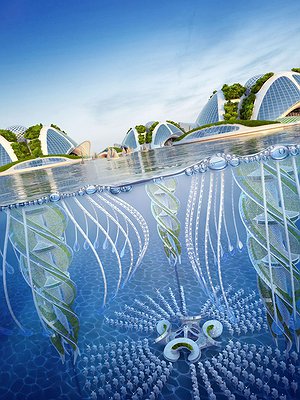
Author: Levai Ivett
Allow me to say something about myself in few words...
My name is Ivett Levai, and I am a medical dentistry student in Szeged, Hungary. I have always loved science and medicine, so for me it was not a difficult process to choose a profession. It motivates me all the time to solve future problems, and help people to get their life better. Thus I was very happy when I heard about this competition, and I hope that you will enjoy my potential ideas and my thoughts about the future life.
The entire lifestyle of humanity could be transformed by the coronavirus pandemic. Will we be flying to distant continents in the same way as before, or we will try to move to another planet after big pandemics, knowing that this is how the global spread of the infection began? Will we follow the same economic principles?
It is always a big question, what will happen next week, next year or in the next century. Life would be better and easier or there comes a big pandemic, which destroys our everyday life and which is not only harmful for our body, but also for our mental health. Who would have thought that with a modern health care, we would get to that point where we were still struggling with the COVID-19 virus after more than a year? I do not think that anyone was really prepared for that. Fortunately, many acclaimed scientists have been able to develop vaccines in a relatively short period of time to help end this pandemic. Looks like we can get out of this limited life soon, and everything will be as normal as before the virus. I am confident that we will able to deal with future problems so well.
One of my visions for the future is that, we will have faster solutions for preventing pandemics. It should be stipulated that in the event of any crisis we must have reserve money from all banks, giant companies, countries, and associations which they have been set aside for this purpose over the years. The Word Economy must have a system with sufficient fund if such vaccination or shelter has to be created in a short term.
According to studies, investing 20 billion euros a year to monitor and police the wildlife trade and curb tropical deforestation will help us to prevent pandemics in the future. I think it is a very important factor to keep our environment clean, because many pathogens cannot survive and spread. Furthermore, we have to invest million dollars a year on early detection and control measures.
I think it is relevant what we eat, and we must know what is in our food. So we have to strengthen monitoring food systems and to develop food sources and livelihood alternatives. As we know, not controlled and inspected food can also cause epidemics and diseases. Thus not only health-, but also food related sectors need to be improved. What belongs to this topic is nothing but the environment? I can envision the food department of the future, in such a way that professionals can breed and grow in a huge separate sterile envelope or coverage. Also the control and the nutrition can take place in such places as well- maybe our grandchildren generation will reshape the dining rooms and kitchens at home, so that everything which they will eat is not going to be contaminated.
It is clear, that pandemics which are much more severe and serious than COVID-19 could come, if we continue to destroy biodiversity and climate. In my opinion, if the emphasis in the future were on prevention rather than curbing, it would be more cost- effective in social, climate, economic and environmental terms. So, the COVID pandemic has shown that we are not immune to infections that can reach us extremely quickly from anywhere in the word. Radical changes in natural habitats, loss of biodiversity, and climate change are having a significant impact on existing and long-forgotten pathogens worldwide. If I well informed, today’s virus comes from an Wuhan market, so markets may not exist in the future, and people will only buy from places like supermarkets and shopping malls. I consider it very important to reduce the epidemiological risks arising from wildlife.
I can imagine the life in 2100 as in science- fiction movies; maybe we are not very far from these cinematic environments. People will be able to live in so-called “earth-scraper” (like skyscraper) in buildings that extend 25 floors deep below the ground. Or I can visualize that next generations will live in underwater “bubble cities”, which would enable to explore depths previously unknown to human. These separate cities can help prevent possible viruses from spreading to other bubble cities, thus preventing a pandemic from developing.
Returning to the meal, I also think it is conceivable that in the future we will be able to print food that can be consumed in the future, and even download it from the internet from our favourite chef’s site, which we will be able to consume in minutes.
In conclusion, I believe and I trust that we can defeat the pandemic, as soon as possible, in fact, I know it will end soon. Let us try to learn from our mistakes in order to have better life for future generations. After one million dead and countless ruined economies, we cannot afford to make the same mistakes as in the past.
The list of sources:
COVID-19 Pandemic, Geospatial Information, and Community Resilience : Global Applications and Lessons
by Abbas Rajabifard , Edited by Daniel Paez
A jövőről – Az Emberiség kiáltásai, by Martin Rees